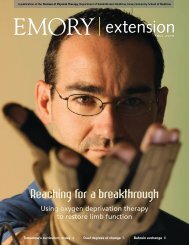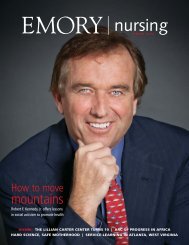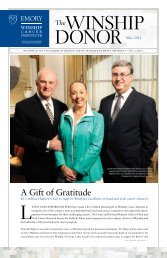medicine - Woodruff Health Sciences Center - Emory University
medicine - Woodruff Health Sciences Center - Emory University
medicine - Woodruff Health Sciences Center - Emory University
You also want an ePaper? Increase the reach of your titles
YUMPU automatically turns print PDFs into web optimized ePapers that Google loves.
mon causes and a few less common, even rare, causes.”<br />
Heart failure occurs when the heart muscle loses pumping<br />
strength and no longer supplies enough oxygenated<br />
blood to the rest of the body. The body responds to a weak<br />
heart the same way it would to low blood volume from<br />
dehydration or bleeding. When there is too little to go<br />
around the entire body, blood diverts from peripheral vessels<br />
and arteries to sustain the heart and brain. Arteries and<br />
blood vessels throughout the body eventually narrow to<br />
keep blood pressure up.<br />
Those with heart failure feel exhausted and short of<br />
breath. Their kidneys hold onto salt, making them constantly<br />
thirsty. They crave salt and fluid, which leaves them<br />
more congested, creating a vicious cycle. Over time, every<br />
organ system in the body suffers, including the heart itself.<br />
Addressing underlying causes<br />
No one lives forever, but keeping heart disease risk factors<br />
at bay can help people make the most of their later years,<br />
says Butler.<br />
“Without diabetes, obesity, smoking, or high blood<br />
pressure by the age of 50, a person is very unlikely to have<br />
clinical symptoms from heart disease for the rest of their<br />
lives,” says Butler, who is deputy chief science officer for the<br />
American Heart Association. “But obesity and diabetes epidemics<br />
continue to worsen, contributing to even more heart<br />
failure. Also people who are treated for heart attack survive<br />
longer now but in turn live with a weaker heart. We need to<br />
focus on prevention and treatment in a comprehensive way.”<br />
In the past, he says, heart failure specialists “let the proverbial<br />
elephant get by while focusing solely on treating the<br />
resulting heart disease.” Because heart failure is a complex<br />
chronic disease, prevention and successful treatment are<br />
related to psychosocial factors such as patients’ literacy level,<br />
their comprehension of their treatment regimen, and their<br />
level of social support.<br />
“We need to collect data for a variety of different players<br />
on the health care team,” he says. “Surgeons, nurses, and<br />
social workers all look at heart failure from a different angle.”<br />
Butler has developed an infrastructure for a comprehensive<br />
cohort study of patients with heart failure.<br />
Researchers already have begun collecting comprehensive<br />
baseline data on patients at <strong>Emory</strong> hospitals and at Grady<br />
Hospital. Patients in the study return to the clinic every six<br />
months for follow-up.<br />
WINTER 2010 13
















